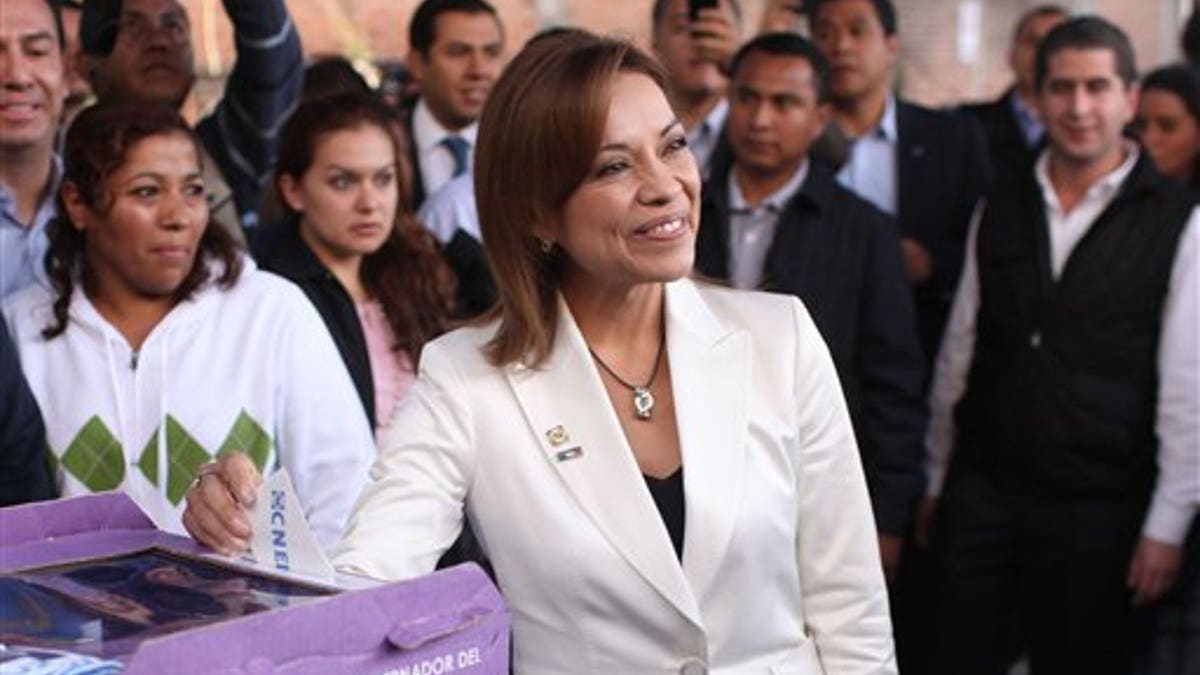
Josefina Vasquez Mota, center, presidential candidate of Mexico's National Action Party, PAN, casts her vote during the party's primary elections in Huixquilucan, Mexico, Sunday, Feb. 5, 2012. If nominated Vasquez Mota would be the first woman of a major political party to run for Mexico's highest office. (AP Photo/Alexandre Meneghini)
Mexico made history Sunday night, with its ruling party's selection of a female presidential candidate.
The National Action Party picked Josefina Vázquez Mota, betting that the charismatic former congresswoman will help it erode the lead held by its powerful rival.
After easily winning the National Action Party's primary Sunday night, Vázquez Mota vowed to unite a party battered by a bloody drug war and help it defeat the Institutional Revolutionary Party, which ruled Mexico for 71 years before being ousted by National Action in 2000.
"I will be the first woman president of Mexico in history," Vazquez Mota, 51, told cheering supporters.
The party's vote for Vázquez Mota over two other candidates sets the race for Mexico's July 1 presidential election. The two other major parties had already selected their candidates.
Vázquez Mota faces an uphill climb against former Mexico State Gov. Enrique Peña Nieto, the front-runner in the polls who could return Mexico's PRI to power after a 12-year hiatus.
The leftist Democratic Revolution Party chose Andrés Manuel López Obrador, who is making his second run after a razor-thin loss in 2006 to President Felipe Calderón. Mexico limits its presidents to a single six-year term.
Mexico is Bound and Determined to Break the Record for Breaking World Records
The personable, cheerful Vázquez Mota invited party members to help her beat the telegenic and handsome Peña Nieto, who is married to a glamorous telenovela star.
"We begin a new road," said Vázquez Mota. "A road to defeat the real adversary of Mexico, who embodies authoritarianism and the worst antidemocratic practices; who represents the way back to corruption and offers impunity as a conviction. The adversary is Peña Nieto and his party."
Vázquez Mota is considered the PRI's strongest challenger, though Mexican voters seem weary of the ruling National Action Party which has governed for 11 years. Delegates are betting that a woman candidate could boost party appeal.
"It injects a certain new note of uncertainty. There's never been a strong female presidential candidate for any other major party before," said Eric Olson, a senior associate at the Woodrow Wilson Center's Mexico Institute. "It adds that historical element and maybe some excitement."
Others argue that the party, known as the PAN, is tainted by a crackdown on drug cartels that has seen violence soar, stalled reforms and corruption.
"Josefina arrives with a weakened party," said Soledad Loaeza, a political science professor in Colegio de Mexico who has studied the evolution of the PAN. "The electorate is not willing to see her as an alternative."
José Espina, president of the party's election commission, says Vázquez Mota obtained 55 percent in Sunday's primary, with 89 percent of the polling stations counted. The party's president, Gustavo Madero, later confirmed her nomination.
She was not Calderón's choice to compete for the party, though he appointed her education secretary after she served as his campaign manager in 2006. The party establishment had supported former Finance Secretary Ernesto Cordero.
But the party's rank-and-file membership handed her a victory from the polls. Her two opponents showed their support after the results were announced. More than 400,000 people voted in the primary
Calderón was not the choice of his predecessor, Vicente Fox, whose election in 2000 booted the PRI out of office after 71 years of single-party rule.
The fact that Calderón still won the party nomination and went on to surprise everyone and defeat Lopez Obrador provides a template for Vázquez Mota to pull an upset, even though she now trails Peña Nieto by nearly 20 points in the polls.
Cordero obtained 38 votes, and the third candidate Santiago Creel, a former senator who also ran in the 2006 primaries against Calderón, got 6 percent of the votes.
Women have run for president in Mexico before, but not representing any of the three major parties.
The PAN's choice of Vázquez Mota may have been the wisest, according to political analysts.
"A PRI victory is still the most likely outcome, but it's almost inevitable the race will tighten," said Pamela Starr, a professor at the University of Southern California who writes on Mexican politics. "It will be an interesting campaign, regardless."
Vázquez Mota's party opponents had complained she was a weak lawmaker and couldn't push through an educational reform as secretary.
A married mother of three, Vázquez Mota has used her family life on the campaign trail to garner the support of Mexican mothers and young voters.
"Today I'm committed to take care of your families like I've taken care of mine," she said Sunday. "I want to make Mexico the best country to live in."
Some say Mexico isn't prepared for a woman president, unlike other Latin American countries, but analysts disagree.
"I don't think Mexico is any less ready for a female president than Chile for example," Starr said.
Brazil, Argentina, Chile and Costa Rica are among the nations in Latin America that have recently elected women to their higher posts.
This is based on a story by The Associated Press.
Follow us on twitter.com/foxnewslatino
Like us at facebook.com/foxnewslatino











































